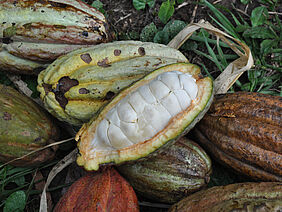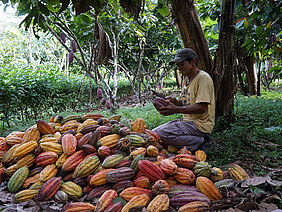The recent article in the Journal of Environmental Management co-authored by Laura Armengot working in the Department of International Cooperation at the Research Institute of Organic Agriculture (FiBL), has quantified the environmental impact of the cacao agrifood system considering the production, manufacture and transportation phases until retail sale.
Given that there is no local "alternative" for chocolate at the main consumption centres, cacao must travel long distances to reach its end consumer. Chocolates long supply chain contribute significantly to the environmental impact of chocolate. Within this context of globalization, it is crucial to understand whether the transportation phase cancels out the ecological advantages obtained from organic agriculture in the production phase.
Cradle-to-retailer approach
The life cycle assessment approach was used to capture and analyse Greenhouse Gas Emissions (GHG) and other ecological impacts from cradle-to-retailer of Ecuadorian cacao. Three production systems were compared, i.e., monocultures and agroforestry’s under conventional management and agroforestry’s under organic management. In addition, three different supply chain scenarios with varying weights in the transportation phase, were studied. The carbon footprint of organic chocolate’s life cycle was 6 % - 34 % lower compared with conventional agroforestry and conventional monocultures systems. From different scenarios evaluated on the distances that the cacao/chocolate travels until the consumer, authors found that the relative weight of the transportation in relation to the total GHG emissions can reach up to 51 %. Under these scenarios, direct and indirect emissions from transport may cancel out those ecological advantages of organic production due to the scale of the supply chain.
Import-export paradigm
Cacao beans arriving in Europe from tropical countries may be re-exported to third countries. Examples are in the Netherlands and Belgium, even though they are not cacao-producing countries, the two accumulate 18.8 % of the world’s exports of cacao beans. Once the chocolate is manufactured, it can be re-exported, 8 % in Europe and 12 % to North America. Germany is the leading exporting country with 14 %. The results indicate that manufacturing and consuming chocolate for instance in Spain, made from cacao grown in conventional agroforestry systems may have a lower impact in terms of GHG emissions than transporting organic chocolate from Germany by truck to Spain. Also, if the focus is widened, the research has shown how transportation can eliminate some of the comparative ecological advantages obtained in the farming phase.
Optimising cacao supply chain
Organic certification systems can send an incomplete message to the consumers if they do not account for the environmental impacts following harvest, including those related to transportation. If one of the objectives of organic production and consumption is to reduce the environmental impact of food, it will be necessary to optimise cacao transportation. Directly exporting chocolate from cacao-producing countries and relocating chocolate manufacture would help reduce the carbon footprint and other environmental impacts of the organic chocolate supply chain.
Given the pressures of climate change and the increasing environmental impacts of agriculture, there is an urgency within the organic sector to discuss how to reflect efficiency and means of transportation in its certification standards, to promote sustainable production and consumption.
Further information
Contact
Laura Armengot Martínez, FiBL Switzerland
Links
sciencedirect.com: Article "Transportation can cancel out the ecological advantages of producing organic cacao: The carbon footprint of the globalized agrifood system of ecuadorian chocolate"





